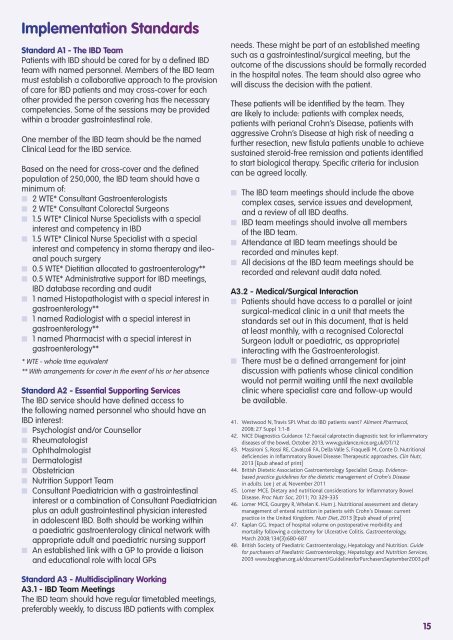IBDstandards
IBDstandards
IBDstandards
You also want an ePaper? Increase the reach of your titles
YUMPU automatically turns print PDFs into web optimized ePapers that Google loves.
Implementation Standards<br />
Standard A1 - The IBD Team<br />
Patients with IBD should be cared for by a defined IBD<br />
team with named personnel. Members of the IBD team<br />
must establish a collaborative approach to the provision<br />
of care for IBD patients and may cross-cover for each<br />
other provided the person covering has the necessary<br />
competencies. Some of the sessions may be provided<br />
within a broader gastrointestinal role.<br />
One member of the IBD team should be the named<br />
Clinical Lead for the IBD service.<br />
Based on the need for cross-cover and the defined<br />
population of 250,000, the IBD team should have a<br />
minimum of:<br />
■■<br />
2 WTE* Consultant Gastroenterologists<br />
■■<br />
2 WTE* Consultant Colorectal Surgeons<br />
■■<br />
1.5 WTE* Clinical Nurse Specialists with a special<br />
interest and competency in IBD<br />
■■<br />
1.5 WTE* Clinical Nurse Specialist with a special<br />
interest and competency in stoma therapy and ileoanal<br />
pouch surgery<br />
■■<br />
0.5 WTE* Dietitian allocated to gastroenterology**<br />
■■<br />
0.5 WTE* Administrative support for IBD meetings,<br />
IBD database recording and audit<br />
■■<br />
1 named Histopathologist with a special interest in<br />
gastroenterology**<br />
■■<br />
1 named Radiologist with a special interest in<br />
gastroenterology**<br />
■■<br />
1 named Pharmacist with a special interest in<br />
gastroenterology**<br />
* WTE - whole time equivalent<br />
** With arrangements for cover in the event of his or her absence<br />
Standard A2 - Essential Supporting Services<br />
The IBD service should have defined access to<br />
the following named personnel who should have an<br />
IBD interest:<br />
■■<br />
Psychologist and/or Counsellor<br />
■■<br />
Rheumatologist<br />
■■<br />
Ophthalmologist<br />
■■<br />
Dermatologist<br />
■■<br />
Obstetrician<br />
■■<br />
Nutrition Support Team<br />
■■<br />
Consultant Paediatrician with a gastrointestinal<br />
interest or a combination of Consultant Paediatrician<br />
plus an adult gastrointestinal physician interested<br />
in adolescent IBD. Both should be working within<br />
a paediatric gastroenterology clinical network with<br />
appropriate adult and paediatric nursing support<br />
■■<br />
An established link with a GP to provide a liaison<br />
and educational role with local GPs<br />
needs. These might be part of an established meeting<br />
such as a gastrointestinal/surgical meeting, but the<br />
outcome of the discussions should be formally recorded<br />
in the hospital notes. The team should also agree who<br />
will discuss the decision with the patient.<br />
These patients will be identified by the team. They<br />
are likely to include: patients with complex needs,<br />
patients with perianal Crohn’s Disease, patients with<br />
aggressive Crohn’s Disease at high risk of needing a<br />
further resection, new fistula patients unable to achieve<br />
sustained steroid-free remission and patients identified<br />
to start biological therapy. Specific criteria for inclusion<br />
can be agreed locally.<br />
■■<br />
The IBD team meetings should include the above<br />
complex cases, service issues and development,<br />
and a review of all IBD deaths.<br />
■■<br />
IBD team meetings should involve all members<br />
of the IBD team.<br />
■■<br />
Attendance at IBD team meetings should be<br />
recorded and minutes kept.<br />
■■<br />
All decisions at the IBD team meetings should be<br />
recorded and relevant audit data noted.<br />
A3.2 - Medical/Surgical Interaction<br />
■■<br />
Patients should have access to a parallel or joint<br />
surgical-medical clinic in a unit that meets the<br />
standards set out in this document, that is held<br />
at least monthly, with a recognised Colorectal<br />
Surgeon (adult or paediatric, as appropriate)<br />
interacting with the Gastroenterologist.<br />
■■<br />
There must be a defined arrangement for joint<br />
discussion with patients whose clinical condition<br />
would not permit waiting until the next available<br />
clinic where specialist care and follow-up would<br />
be available.<br />
41. Westwood N, Travis SPI. What do IBD patients want? Aliment Pharmacol,<br />
2008; 27 Suppl 1:1-8<br />
42. NICE Diagnostics Guidance 12: Faecal calprotectin diagnostic test for inflammatory<br />
diseases of the bowel, October 2013, www.guidance.nice.org.uk/DT/12<br />
43. Massironi S, Rossi RE, Cavalcoli FA, Della Valle S, Fraquelli M, Conte D. Nutritional<br />
deficiencies in Inflammatory Bowel Disease: Therapeutic approaches. Clin Nutr,<br />
2013 [Epub ahead of print]<br />
44. British Dietetic Association Gastroenterology Specialist Group. Evidencebased<br />
practice guidelines for the dietetic management of Crohn’s Disease<br />
in adults. Lee J et al, November 2011<br />
45. Lomer MCE. Dietary and nutritional considerations for Inflammatory Bowel<br />
Disease. Proc Nutr Soc, 2011; 70: 329-335<br />
46. Lomer MCE, Gourgey R, Whelan K. Hum J. Nutritional assessment and dietary<br />
management of enteral nutrition in patients with Crohn’s Disease: current<br />
practice in the United Kingdom. Nutr Diet, 2013 [Epub ahead of print]<br />
47. Kaplan GG. Impact of hospital volume on postoperative morbidity and<br />
mortality following a colectomy for Ulcerative Colitis. Gastroenterology,<br />
March 2008;134(3):680-687<br />
48. British Society of Paediatric Gastroenterology, Hepatology and Nutrition. Guide<br />
for purchasers of Paediatric Gastroenterology, Hepatology and Nutrition Services,<br />
2003 www.bspghan.org.uk/document/GuidelinesforPurchasersSeptember2003.pdf<br />
Standard A3 - Multidisciplinary Working<br />
A3.1 - IBD Team Meetings<br />
The IBD team should have regular timetabled meetings,<br />
preferably weekly, to discuss IBD patients with complex<br />
15


